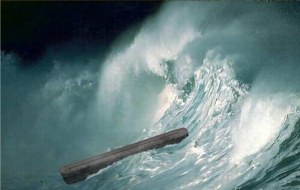So sayeth those opposed to Creationism, the belief that an all-powerful God created the universe and all that we see and perceive in the physical or even spiritual world. Regardless of your particular idea of creationism, whether you have a Muslim theology or a Christian one, or whether you believe the universe is very old or very young, you are simply wrong. All the evidence is against you.
So sayeth others, therefore it must be true.
It’s been going on for awhile in case you missed it and thought it was still up for debate. Writing about nutrition of all things for Real Clear Science, Ross Pomeroy was quick to compare fad-diets with religion.
“…both cults and diets profess to have “answers” and impart benefits that will irrevocably change your life for the better. Veganism’s pitch isn’t very unlike Scientology’s. Caveman Diet’s isn’t all that different from certain sects of Evangelical Baptism”
Excuse me what? Baptism? Are people getting baptized for it’s health benefits or even spiritual benefits? Why didn’t I know this? Someone should mention to Ross that baptism isn’t about its benefits. It’s a outward act that says I belong to Jesus from this day forward. It’s symbolic, not therapeutic for crying out loud. What a weird analogy.
But nice job coming after my religion when I was trying to read an article about dieting… geez.
Ross made a better analogy, at least in terms of actually having something to do with the subject, a bit later.
“With all the conflicting and poorly designed research out there, it’s easy to find evidence to back any dietary assertion. In the same manner, overly religious types, such as those who promote creation science, latch on to data that coincides with their beliefs and disregard everything else. Though their ideas are awash in woo, staunch creationists can present a very persuasive case.”
I certainly qualify as overly religious if that is possible. By this time I have forgotten that the article is actually over diet plans, and have become immersed in the typical attack of our culture against Jesus. Simply dismiss it without another word. Those of you who have been digging into the details, the evidences, and the facts are wasting your time. It’s decided already. No one won the debate, in fact Ross admits creationists can be persuasive, but that’s beside the point. It’s over.
As proof, and as proof that Ross was only mildly interested in writing about dieting, he linked an article attacking creationism entitled “15 Answers to Creationist Nonsense.”
After all who listens to nonsense? That’s the point, see. The argument is over.
Our world does not write these articles or say these things with the purpose of having an enlightening discussion. They say these things to scoff just as the Bible predicted they would in II Peter chapter three. And although it was talking about something else, the advice of Revelation 14:12 “This calls for patient endurance on the part of the people of God who keep his commands and remain faithful to Jesus” applies very well.
Patience is very much in order, especially as I perused the article he linked.
You gotta love that the #3 Answer of the 15 Answers to Nonsense was upset that creationists give a “blanket dismissal of evolution.”
lol
Pot? Kettle. Kettle? Pot.
Ok, seriously though. What if we actually dug into these things instead of dismissing each other? I’d be willing to bet Bible believing Christians would realize that not all scientists are militant atheists, and militant atheists would realize that Bible believing Christians often have scientific degrees, credentials, and a valuable point of view.
And we’d all learn a lot of science.
For instance, the fact we do not find humanoid skeletons in the lowest layers of the earth does not prove humans evolved, even though evolution would predict that we would not find humans there. Score one for evolution, but there are other explanations, even ones consistent with the Bible, which also predict finding the same thing.
Harder questions remain for evolution such as when it misses predictions, which it has often done. Evolution predicted that we would find junk DNA for instance, yet that turned out to be largely untrue. It predicted that Neanderthals would have smaller brains which is completely untrue, and it predicted we would find transitional forms, a slow development of life in the fossil record, and DNA proof that we all came from a single cell in one evolutionary tree.
And figuring out how something mutates into a substantially different creature sporting radically different DNA has been next to impossible in evolution so far. In other words, everyone tells you evolution happened, but no one can do more than guess at how it happened. But trust us, they say, it did.
One final point. When you are left with blaming alien beings from outer space as your best guess for how it all started… you know you’re struggling.
The crazy thing is all of this is incredibly interesting. Too bad the discussion is over because this is the best it’s ever been. In fact, even though Christians are usually accused of being closed minded, the truth is most evangelical churches I know do NOT tell people to shun science. Instead they advise to question everything and examine closely.
Even if the rest of the world is done examining.



 Blogging through the New Year on Central Standard Time. Another year is going into the books tonight and where are we? Where are you? Where am I? Beyond a shadow of a doubt things are changing in our world, our culture, and always, always, always things change for us on a personal level. Here are some thoughts on all three. I’ll be blogging for the rest of the year, so feel free join in below.
Blogging through the New Year on Central Standard Time. Another year is going into the books tonight and where are we? Where are you? Where am I? Beyond a shadow of a doubt things are changing in our world, our culture, and always, always, always things change for us on a personal level. Here are some thoughts on all three. I’ll be blogging for the rest of the year, so feel free join in below.


 There are two groups of Christians who believe that the universe was created by God. The group that believes He did it in 6 actual days just a few thousand years ago, and the group that believes God did it billions of years ago. Both groups often claim to interpret the Bible straightforwardly because the Bible never specifically says how old the earth is. Thus it becomes a question over who has the proper interpretation. An argument usually ensues over the Hebrew word “yom,” possible gaps of time, how long the seventh day actually lasted, and more.
There are two groups of Christians who believe that the universe was created by God. The group that believes He did it in 6 actual days just a few thousand years ago, and the group that believes God did it billions of years ago. Both groups often claim to interpret the Bible straightforwardly because the Bible never specifically says how old the earth is. Thus it becomes a question over who has the proper interpretation. An argument usually ensues over the Hebrew word “yom,” possible gaps of time, how long the seventh day actually lasted, and more. Let the conspiracy theories begin! I love aliens-invade-earth type of movies, and was delighted to see the “Cowboys and Aliens” preview during the Super Bowl. THAT should be fun. But wow, shouldn’t these movies start to take a number and get in line? It seems we’ve got movies about aliens invading the earth coming out of our pointy green ears. They’re everywhere! Run for your lives!
Let the conspiracy theories begin! I love aliens-invade-earth type of movies, and was delighted to see the “Cowboys and Aliens” preview during the Super Bowl. THAT should be fun. But wow, shouldn’t these movies start to take a number and get in line? It seems we’ve got movies about aliens invading the earth coming out of our pointy green ears. They’re everywhere! Run for your lives!
